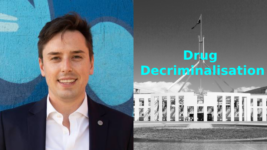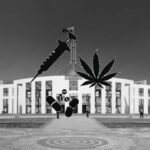ACT Decriminalises Drug Possession: Labor MP Michael Pettersson on Forging Reform

That the century-old system of drug prohibition is a failure is well-established in legal circles, amongst medical experts, those who partake in illicit substances, families who’ve lost loved ones to the use of them, and a growing cross section of the community.
And just like moves towards legalising cannabis, when it comes to measures that serve to reduce the harms that illicit substances cause, the global trend is towards decriminalisation: the removal of criminal sanctions related to the personal possession and use of unlawful drugs.
The nation of Portugal did this in 2001, whilst it was in the grips of a heroin crisis, and two decades later, the resulting reduction in drug-related harms is globally renowned.
While the US state of Oregon moved to a decriminalisation model early last year, with other US jurisdictions set to follow.
And now ACT Labor MLA Michael Pettersson has done the seemingly impossible under our nation’s political climate, as he introduced a drug decriminalisation private members bill in February last year, and last week, the vast majority of the ACT government passed the bill into law.
Avoiding the courts
In her supplementary explanatory statement to the amended bill that passed last Thursday, ACT health minister Rachel StephenSmith explains the historic move will not take effect until 12 months from its passing, in order to “allow for appropriate police training”.
So, this time next year, a Canberran found with a small quantity of MDMA on them will not be arrested and face maximum penalties of up to 2 years gaol and/or an $8000 fine, as they currently do.
Instead, the attending officer can either decide to send an individual to a drug treatment program if assessed as necessary or otherwise issue the civilian with a small fine – a civil offence, not a criminal one – which will be $100.
This model is based on a cannabis decriminalisation system that the capital territory established in 1992. And while covering the fine may be an issue for the more marginalised in society, they do have the option of attending the drug diversion program instead, which results in forgoing its payment.
A corresponding list of the most popular psychoactive substances used in our society will be contained in a table within regulations related to the Drugs of Dependence Act 1989 (ACT). And this outlines the personal or small quantity limit of listed substances that makes one exempt from arrest.
In the footsteps of cannabis reform
The 1992 cannabis decriminalisation program in the ACT is called the Simple Cannabis Offence Notice scheme. But it has not applied to adults since January 2020 after their use and personal possession of cannabis was legalised in the capital territory.
The new decriminalisation model will reform this 1990’s scheme so it’s now called the Simple Drug Offence Notice scheme and it incorporates a wider range of illicit substances contained in the regulations, which can be updated by the minister to reflect new and emerging drug trends.
Sydney Criminal Lawyers spoke to ACT Labor MLA Michael Pettersson about the model of drug decriminalisation the territory parliament has passed, about the legalisation of the adult use of cannabis that he initiated earlier and what he expects the impact of the new laws will likely be.
Michael, your private member’s bill regarding the decriminalisation of the personal possession of small quantities of drugs was passed by ACT parliament on 20 October, with 13 MPs in support and six against.
So, broadly speaking, how is the system of drug decriminalisation going to work in the ACT? What happens, say, if a person is found with a small quantity of MDMA on them?
The ACT has had on the books a decriminalisation framework called the Simple Cannabis Offence Notice scheme for 30 years.
In recent years, we made reforms to that scheme, which moved adult users of cannabis out of it and towards legal possession.
The bill that I brought forward amended the SCDN scheme and made it a Simple Drug Offence Notice scheme.
This involves qualities laid out in the framework for eligible substances, so if individuals are found in possession of those quantities, they’ll have those substances confiscated and then the police officer will choose to either issue a fine and confiscate the substance or divert them to a drug service, whilst also confiscating the drug.
I’ve seen people suggesting on social media that what’s been passed isn’t true decriminalisation because fines and prison time still applies for possession.
Can you explain why penalties of prison time and steeper fines still appear in the Act in relation to drug possession, while small quantities of illegal drugs don’t result in drastic fines or any gaol time?
There is a pretty ferocious discourse within the drug law reform community, as to the different definitions of legal, illegal, and where decriminalisation sits in relation to that.
To me it’s a spectrum. So, while the ACT has had the Simple Cannabis Offence Notice in place for nearly three decades, I haven’t seen anyone saying that it was not decriminalisation.
So, I’m somewhat confused by people from interstate who are trying to classify these reforms as not being decriminalisation.
Now, they don’t go as far as some advocates want them to go, but this is a sensible step forward that will do a lot of good in our community.
So, although some people have asserted that prison time and hefty fines could still be applied for possession of a personal, or small, amount of a listed illicit substance, this isn’t the case?
There are a few different thresholds, and we’ve changed the response for those thresholds.
For those small quantities of certain substances within the decriminalisation framework you can be eligible for a fine or the diversion program.
If you’re found in possession of larger quantities than the decriminalisation threshold, but below the traffickable threshold, the maximum penalty will no longer be two years in prison, but six months.
But I do also want to suggest that ACT drug diversion, as well as the possibility of proceeding through a drug court and not a traditional criminal court, will remain an option for those individuals.
So, for the small quantities involved in the decriminalisation framework, prison time is no longer an option.
And what about the fine that applies?
The legislation says that the maximum penalty for possessing a small quantity will be one penalty unit, which at the moment would be $160.
However, there is a line in the legislation that says the fine will be set at $100.
So, this is like a slap on the wrist for small quantities of drugs compared to the 2 years in prison and 50 penalty units that currently apply to them?
Yes. It’s that or drug diversion. We are relying on ACT police to show good judgement in knowing what the appropriate response is. Where someone needs help and drug diversion is well suited, that will happen.
But not every individual who uses drugs is in need of drug diversion and the punishment is the removal of the drugs and a one hundred dollar fine.
Recommendation 3 of the committee inquiry into the bill recommended a catch-all clause that would account for new and emerging drug trends.
Is there a mechanism in the legislation that will provide for these sorts of changes or for drugs that aren’t currently listed on the table of the most commonly used psychoactive substances?
A sensible amendment that the minister for health brought forward was to remove the substances that are included in the decriminalisation framework out of statute law and instead place them in the regulations, so the minister can update this.
So, it’s possible now for the ACT to have a relevant and up-to-date list of substances that are causing harm in our community.
You also instigated the legalisation of the adult possession and use of cannabis, which has been in place since 31 January 2020. As far as anyone you ask is concerned, this has not caused any issues whatsoever.
Can you talk about the impact that it has had? And given that, how do you expect the shift to the decriminalisation of a broader range of illicit substances is going to go?
When it comes to the legalisation of cannabis possession in the ACT, the sky has not fallen in.
Broadly speaking, the same people who are using cannabis before those reforms continue to use cannabis and the people who were choosing not to use cannabis before those reforms, for the most part, are still choosing not to use cannabis.
The early data shows that there was no increase in hospital presentations related to cannabis. There was no increase in drug driving related to cannabis. And we also saw that wastewater analysis showed that cannabis use in the ACT remained consistent with that of other jurisdictions and their use.
The story is that there is not really a story. The people that said that changing the laws regarding cannabis would have a terrible impact on our community were being disingenuous.
So, the lesson there is for the ACT when it comes to the recent reforms to decriminalise common illicit drugs is that our criminal laws do not have the effect that their advocates say that they do.
Our drug laws have not been able to stop the use of drugs, and they do not stop people from using drugs.
The one thing that will reduce the harm that drugs cause in our community, is to treat the issue as a public health problem, and by removing the possession of these substances from criminal law, we make it easier for people to access the health services they need in an appropriate manner.
Australia’s first fixed-site pill testing or drug checking service opened in Canberra on 14 July. By all accounts, it’s been a success.
This is currently a trial, but so was the Kings Cross medically supervised injecting centre when it first opened its doors in 2001.
How would you say having drug decriminalisation and a drug-checking service both running in the same jurisdiction is going to complement each other?
They do complement each other. In a decriminalisation model, the illicit recreational drugs that people consume are concocted in some of the worst circumstances.
Organised criminal gangs do not have the same safety checks in their production and processes that more reputable pharmaceutical companies do.
So, there will always be a question mark hanging over the substances that people are consuming.
Drug checking is one way that you can go about reducing that harm by providing more accurate information to people that have already made the choice that they want to consume those drugs.
And lastly, Michael, the move to drug decriminalisation has been the want of a wide range of people for decades now. This isn’t just people who use drugs, but it’s medical experts, ex-police commissioners, lawyers, judges, former DPPs, and families.
You introduced this bill about a year after your cannabis laws made it legal to grow a small number of plants at home for personal use.
So, how does it feel to be the instigator of such monumental reforms in this country that could spread to other jurisdictions, and will reduce a variety of harms and save people’s lives? And more so, how were you able to get this across the line?
The honest answer is I don’t spend a lot of time thinking about it. This is an area of public policy that I’ve got very strong opinions about and have clearly been very active on in public life.
But I’ve got too much else on to really sit back and pat myself on the back. So, I always find it somewhat jarring, when people talk about the historic nature of it, because here in the ACT, it’s not really that big a deal.
Overwhelmingly, the community is in favour of these reforms. So, it doesn’t seem like this landmark accomplishment here in the ACT.
Do I think this will flow through to other jurisdictions? Maybe, maybe not. The Australian Capital Territory is inherently a very progressive jurisdiction.
People who think that drug law reform or any type of progress on social issues will naturally flow through to other jurisdictions are sadly mistaken.
What does cause change is political will and activism within communities. And making political leaders in each community take action.
I’ve never met a politician from another jurisdiction that has seen something happen in the ACT or any other jurisdiction and felt guilted into doing something.
So, if people would like to see the reforms that have been implemented in the ACT implemented in their jurisdictions, they’re going to need to get active towards their politicians or maybe get new politicians that share those values, because, unfortunately, people don’t follow the lead of the ACT.
What I’d also like to add to your question as to how did I do this, all of these reforms have only been possible because of the support of my colleagues and their cautious but ultimately supportive approach to these issues.
They have been very supportive of my raising these issues, and they’ve also been very constructive in ensuring this positive result.
So, politics is a team sport.







